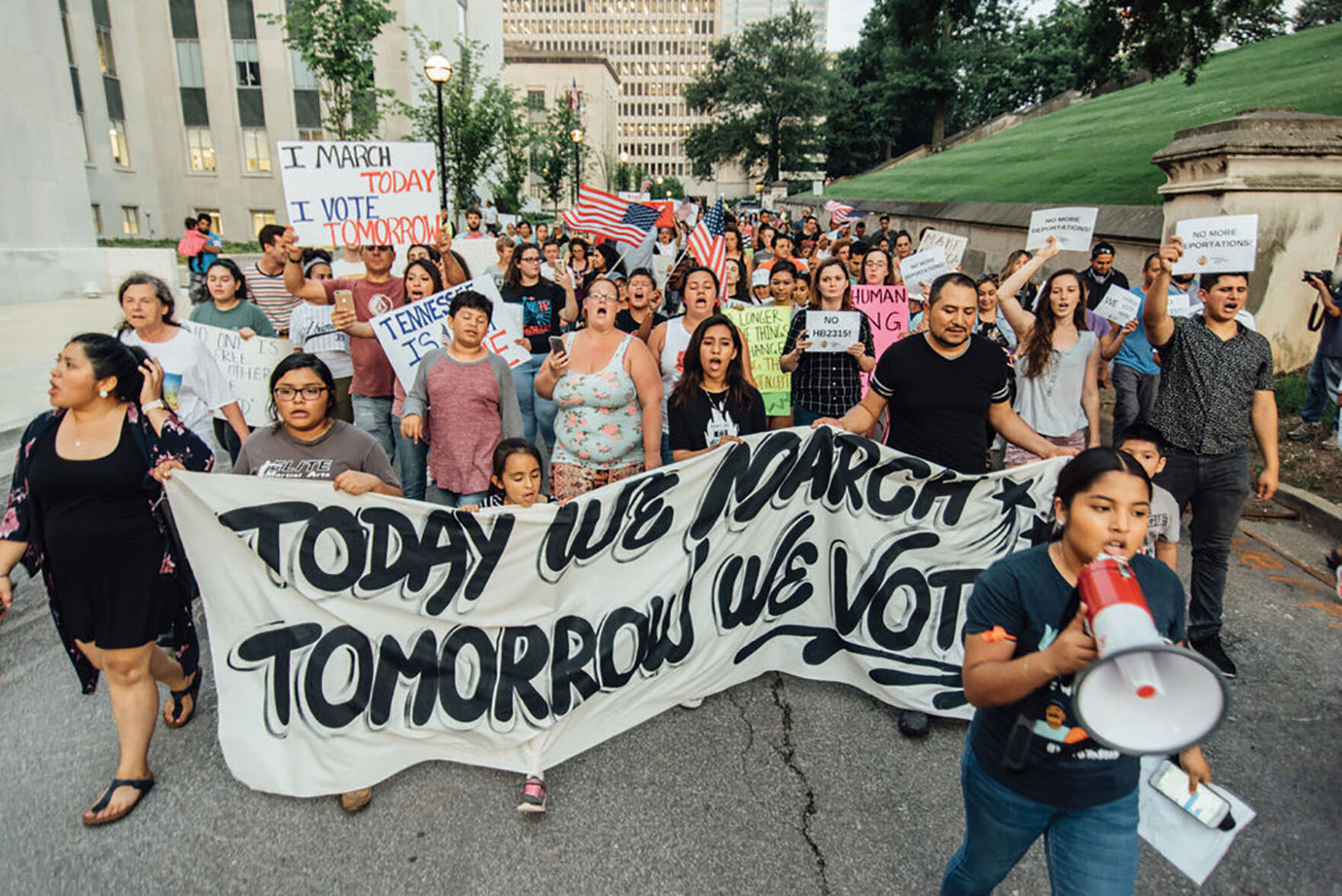President Joe Biden made several promises on the campaign trail, many of which aimed to reverse Donald Trump’s harsh policies on immigration. Some of those goals were on the agenda to be accomplished within his first 100 days in office. Perhaps it isn’t surprising that the administration hasn’t yet fulfilled all of its pledges, but that doesn’t make it any less disappointing for immigrants and advocates who have spent years fighting for policy improvements, including pathways to citizenship.
“He came in with a very bold vision of what was able to happen within the first 100 days,” says Jazmin Ramirez, “and we quickly realized within those first 100 days that those promises … weren’t met.”
Ramirez (no relation with the writer) is the Latinx organizer with the Nashville-based Tennessee Immigrant and Refugee Rights Coalition, and she spoke to the Scene on behalf of TIRRC Votes, the organization’s affiliate group focused on local elections. She says Biden’s lagging policy improvements have been “really debilitating and really frustrating” for advocates and TIRRC members who were impacted by those policies.

TIRRC headquarters
Cesar Rodriguez, a member of TIRRC, says he’s heard family friends express skepticism about what changes would come, and he agrees with the sentiment. “Regardless of who’s been in office, most of these promises regarding that topic tend to not be kept, especially in terms of deadlines,” he says. “The more ambitious, the less likely they are to actually be fulfilled.”
Granted, there was a moment of relief when Biden assumed the office.
“I remember having community meetings,” says Ramirez, “and there was a sense of hope within our community of being able to just breathe after living under a Trump administration for four years.”
And certainly, there were some significant changes. Biden ended Trump’s policies that resulted in immigrant families being separated at the U.S.-Mexico border. Another big improvement came in the form of a memo halting the Immigration and Customs Enforcement agency’s practice of raiding worksites, which often swept up massive numbers of undocumented immigrants at a time. Ramirez says the memo felt especially significant in Tennessee, considering the 2018 raid in Morristown that saw nearly 100 people arrested by ICE and other agencies.
Even so, Biden hasn’t halted the use of Title 42, a health policy that has been invoked during the pandemic to bar and deport immigrants even without formal deportation orders. The president’s attempts to end Trump’s “Remain in Mexico” policy — under which migrants seeking asylum were sent to Mexico to await asylum hearings — have been unsuccessful. Biden formally ended Trump’s so-called “zero tolerance” family-separation policy at the border, but even that has yet to be tidily resolved. About 1,000 families remain separated, and some advocates have criticized the administration’s move to dismiss settlement claims with families affected by Trump’s policy. And even though the president raised the refugee cap to 62,500 from 15,000 in May, the U.S. resettled a record low of 11,411 in 2021. Ramirez also points to Biden’s increased deportation of Haitian immigrants, which some critics note may be the result of unclear policies and messaging.
Ramirez says proposed changes to Deferred Action for Childhood Arrivals would weaken the program. The Biden administration would have beneficiaries apply separately for deportation deferral and work permits, seemingly an effort to navigate challenges in the courts. Ramirez says this makes work permits “open to being taken away” and would affect 7,000 current DACA recipients as well as 13,000 eligible recipients in the state. Other groups around the country have also warned this could complicate the application process.
DACA was implemented via executive order by Barack Obama. It allows undocumented immigrants who entered the country at a young age to work and get driver’s licences without the threat of deportation. While it proved to be popular, that didn’t stop Trump from trying to end the program.
The highest-profile stumble may be the potential removal of Biden’s bill to create a pathway to citizenship from his stalled Build Back Better budget package. As that legislative package gets whittled down in Congress, that item seems less likely to make the cut. Rodriguez says that’s been the biggest disappointment for him.
“It wouldn’t just apply to DACA recipients, it would apply to essential workers as well,” he says of the bill’s aim to grant citizenship to millions of undocumented immigrants. “My mother, a few years back, went back and got her GED and she became a certified medical assistant, and she’s been working, doing that for a few years now. So if that were to pass, the hope would be that she would also qualify as well.”
The emphasis on essential workers also points to the hardship immigrant communities have faced during the pandemic. These communities have faced higher rates of COVID-19 infection, and are more likely to work in essential jobs with fewer protections due to their immigration status.
Ramirez points out that — if the bill hadn’t stalled — DACA recipients and another 90,000 undocumented immigrants in Tennessee would have been eligible for citizenship. “That also is almost 100,000 people in the state of Tennessee that would be available to have some sort of relief to drive safer, have access to health care or health insurance through their employers,” she says.
“The pandemic has shown us exactly why we need some of that protection,” says Ramirez. “There is no paid time off. There is no sick leave. There is no vacation time.”
Rodriguez and his brothers also work at jobs deemed essential.
“The frustration there is that, if we were so essential when the pandemic started, what changed?” says Rodriguez. “Because clearly COVID is still running rampant. Clearly we’re still essential. But the frustration of hearing that in words only and not seeing any actions taken — well, it really does get to people.”
But Ramirez notes that the shortcomings of Biden’s first year don’t mean it’s time to stop fighting.
“It gives us more fuel to keep fighting and to keep pushing until there is a permanent solution,” she says, “because we know that our communities are directly impacted by the inaction.”






